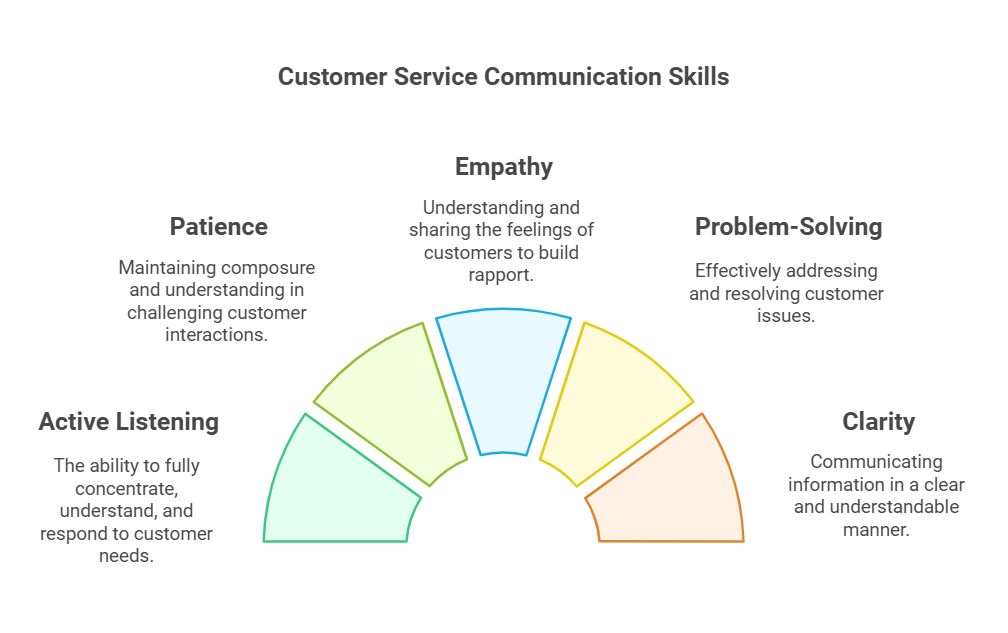Today’s consumers have never had more choices when it comes to product or service providers. This means that a solid customer support team is even more important when it comes to attracting and retaining customers. And customer service communication skills must be on point.
Even one instance of poor customer experience is enough to lose a customer. In fact, an American Express customer service study found that 33 percent of consumers would consider switching companies immediately after experiencing poor customer service.
On the other hand, a very positive customer service interaction can prevent customers from doing business elsewhere, even if they have experienced an issue of some sort. According to Salesforce, 78 percent of consumers “will forgive a company for its mistake after receiving excellent service.”
Customers want to be heard. They want to feel as if the problem they’re experiencing matters to the person with whom they’re speaking. The representatives with highly developed communication and interpersonal skills and a high level of emotional intelligence make customers feel this way. These skills don’t come naturally to everyone. But they can all be learned and developed through practice. In this article, we’ve identified seven of the most important communication skills for customer service representatives. We also offer some tips for developing them. Mastering these skills will help anyone become a more effective communicator. Lasting relationships with customers and an enhanced brand reputation will naturally follow.

1. Active Listening
More than merely listening, active listening applies focus and attention to what the customer is saying. It’s easy for a customer to tell when a customer service agent isn’t really listening to them. Simply going through the motions as if reading from a script just won’t do. Active listening, or effective listening, is also key in preventing miscommunications.
Tips on Developing Active Listening
- Focus on the customer. Don’t pull up files or work on other projects when you’re listening to him or her.
- Show interest in what the customer is saying through confirmation language such as “I see” or “I understand.” If applicable, nod and maintain eye contact during the interaction.
- Repeat back to the customer the jist of what he or she has just said to you. This demonstrates that you understand and were actively listening.
- Ask open-ended questions that allow the customer to elaborate. This shows them you’re trying to completely understand their concern or problem.
- Practice active listening with coworkers, friends, or family members. Skills take practice. After a while, active listening will become natural. Active listening skills will pay dividends in your professional and personal life. Highlighting strong active listening skills on your resume can make you stand out to potential employers, as it demonstrates your ability to communicate effectively and handle customer interactions.
2. Patience
A customer service representative has the difficult job of remaining calm and collected, especially in the face of a frustrated or confused customer. This is no easy task, especially at the end of a long day. Patience can go a long way in helping the customer come away from an interaction feeling positive.
Tips on Developing Patience
- Establish realistic expectations for your interactions. Not every customer will have a problem that can be easily solved. Nor will every customer understand what you’re communicating to them. Understand that this is all part of the process.
- Avoid taking things personally. No one wants to be yelled at or criticized, but do your best to remember that customers may be frustrated or angry due to circumstances beyond your control. It’s not your fault, even if the customer is speaking to you as if it is.
- If you feel your patience is wearing thin, take a small break. Drink some water, stretch, or speak with a coworker to reduce your stress and frustration.
3. Empathy
Empathy, or putting yourself in someone else’s shoes, is a difficult skill to develop. However, it’s one of the most powerful skills you can use during customer interactions. Even if you can’t fully relate to a customer, there are ways to show them you care. As more companies turn to automation for customer service, the human touch will go a long way toward creating loyal customers.
Tips on Developing Empathy
- Use phrases like “That must be very frustrating” or “I can see why you’re upset.” Empathy statements let the customer know that you’re able to see things from their perspective.
- Let the customer know you’re on their side. Confirm to them that their problem or concern warrants action on your part and that you’ll work with them to reach a resolution.
- Avoid being defensive. Customers often see the customer service rep as the person responsible for their issue, despite that rarely ever being the case. Avoid sidestepping blame or addressing fault and focus on resolving the customer’s issue.
4. Problem-Solving
The ability to quickly and effectively solve customer problems is the foundation of all problem-solving skills. The customer has come to you seeking a solution, and they expect you to provide one in a timely manner.
Tips on Developing Problem-Solving
- Acquire a deep understanding of your products and/or services. Before you can come up with the best solution for any given situation, you need to know what the options are. Be able to respond to customer inquiries about a specific product update or general product knowledge. Have relevant details and even free resources on hand to share with customers. This will eliminate a huge amount of customer frustration.
- Come up with multiple solutions. Even if the solution the customer is asking for isn’t possible, providing several other options gives the customer the power to choose. Everyone wants to choose.
- When possible, always choose the best solution for the customer. Even if what they’re requesting is possible, if there’s a better option, advocate for it. This demonstrates your deep knowledge to your current and potential customers.
5. Clarity
When communicating with customers, it’s important to make sure that what you’re saying is exactly what you mean. This is the best way to quickly resolve a customer’s concern. This can be difficult if the product or service is technical or complicated in nature, but in such cases, clarity is even more important.
Tips on Developing Clarity
- Avoid using technical jargon. Customers may not understand what you’re trying to convey.
- Use examples when applicable. Complicated ideas can be made simple with a good example.
- Check for understanding. When you’ve finished explaining something, ask the customer if they’ve understood what you’ve said.
- Be concise. Don’t give the customer unnecessary information that could cloud their understanding.
- Ask clarifying questions. If you don’t understand what the customer is saying, there’s no way you’ll be able to provide the best solution.
6. Persuasion
As a customer service representative, you have limited control over what solutions you’re able to offer to the customer. This means you’ll often have to rely on your persuasion skills. It’s your job to help persuade the customer that your proposed solution will work for them.
Tips on Developing Persuasion
- Build rapport between yourself and the customer. The customer will be more open to accepting your solution if you’ve developed some goodwill between yourself and the customer.
- Highlight the benefits of your solution. Make it clear to the customer how your proposed solution will benefit them, even if it’s not what the customer originally wanted.
- If possible, offer incentives or rewards to the customer. If it’s in your power, a discount or reward can be very persuasive to a customer.
- Use positive language. Discussing an alternative solution with a positive tone can help the customer accept your solution, even if it’s not what they originally wanted.
7. Adaptability
Anyone who has worked in customer service knows that interactions don’t always go according to plan. Being able to come up with the best solutions, even in difficult situations, is what adaptability is all about.
Tips on Developing Adaptability
- Stay informed. Make sure you’re aware of any and all solutions available to customers. This information makes it much easier to adapt to unexpected situations in the future.
- Be flexible. Don’t let rigid operating procedures stifle your ability to adapt to the different needs of customers.
- Collaborate with colleagues. Others might have approaches to problems that you’ve never thought of and could incorporate yourself.
- Provide proactive customer service. Following up after an interaction is a great way to surprise a customer and show them you’re willing to go the extra mile. This may not be applicable in every situation.
- Leverage customer feedback or survey responses to confirm your clients’ satisfaction. If you’re in a customer-facing role, use feedback to verify that you’re asking effective questions and explaining complex concepts. If you find that several customer complaints share a similar theme, adapt your approach to overcome these issues.
Customer Service Communication Skills: A Way to Customers’ Hearts
With the wide range of product and service options available to customers today, positive customer interactions and customer happiness are more important than ever. For those preparing for certifications, utilizing reliable resources like Microsoft AZ-140 practice test dumps can enhance their success. Whether you’re working in a call center talking to customers or communicating via email, text messages, live chat, or social media, investing in these seven skills can greatly enhance the effectiveness of your customer service. Positive interactions, happy customers, and customer retention will prove to you the value of communication skills. Apply these tips to strengthen your customer service communication skills or implement them as part of a customer service training program or business growth initiative.
If you’re looking for a better way to engage with your customers and deliver exceptional service to your customer base, consider using the LiveHelpNow chat service. Chatbots can improve customer engagement and reach customers who aren’t as inclined to contact you via phone. Book a free demo to see what LiveHelpNow can do for your business.




